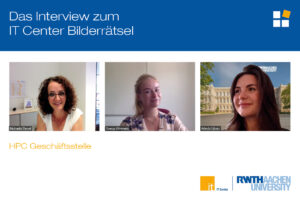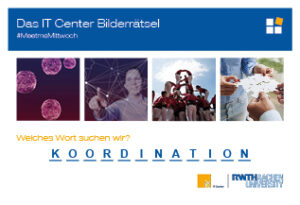MeetMeWednesday: Our series “The IT Center Picture Puzzle” has already gone into the fourth round. Could you guess which word we were looking for this time?
The required word “coordination” stands for the High Performance Computing (HPC) Office. Did you guess it? In this blog post, we present the corresponding interview with the HPC Office, in which you can learn more about the activities and exciting insights of the Office.
Who is behind the HPC Office?
Michaela Bleuel: The HPC Office are responsible for the overall coordination of HPC (High Performance Computing) collaborative projects and take on the classic tasks of science management such as coordinating the internal organization of projects, managing funds, external presentation and reporting to the funding organization. The team of the HPC Office currently consists of seven dedicated employees: These are Sandra Czypionka, Yvonne Kübeler, Justin Lausberg, Katharina Lauscher, Annika Streit, Svenja Wimmers and me, Michaela Bleuel.
What makes the HPC Office so special?
Michaela Bleuel: At the HPC Office, we work at the interface between science and administration. For me personally, the focus is on supporting, enabling and making research and science visible. Sometimes this requires creativity and stamina, for example when it comes to overcoming obstacles on the administrative side or putting complex scientific relationships into easily understandable words or images. It helps a lot that we are such a diverse team of research managers, business economists, graphic designers, media designers, communication scientists and students. Some of us have been working at RWTH for many years and are therefore very well networked within the university. If we get stuck, we can always think of someone to ask!
What are the main tasks of the HPC Office?
Michaela Bleuel: As already mentioned, we work in the field of science management and thus form the interface between science and administration. Thus, we take on classic tasks such as financial management, communication and external presentation for the projects and measures we support. Beyond that, however, I also see an essential part of our work in the strategic further development of projects, for example by collaborating on research proposals and building networks, for example between HPC users and the operators of HPC infrastructures.
What are the current projects/developments?
Michaela Bleuel: In the HPC Office, we are currently mainly coordinating the NHR4CES project (together with TU Darmstadt) and the HPC.NRW competence network. NHR4CES (National High Performance Computing Center for Computational Engineering Science) is part of the National High Performance Computing (NHR) association. The goal of NHR is to provide scientists at German universities with the computing capacity they need for their research and to strengthen their ability to use this resource efficiently.
In NHR4CES, RWTH Aachen University and TU Darmstadt join forces to combine their strengths in HPC applications, algorithms and methods, and in the efficient use of HPC hardware.
The North Rhine-Westphalian Competence Network for High Performance Computing (HPC.NRW) creates the personnel and organizational conditions with which the expertise of the large HPC centers (so-called level 2, or tier 2) is combined with consulting services of smaller (level 3, or tier 3) centers.
It offers a competent and thematically broadly positioned contact and consulting point for HPC users in NRW. To ensure basic services for locations without tier 3 centers and the universities of applied sciences, the tier 2 centers offer a uniform, structured access for HPC users of all universities in NRW. In addition, together with two other colleagues from RWTH and FZ Jülich, we form the offices for the JARA Center for Simulation and Data Science (JARA CSD) and the Modeling and Simulation Sciences (MSS) profile area of RWTH, both in cooperation with Forschungszentrum Jülich, for example with the graduate schools IRTG and HDS-LEE.
What does the future hold for the HPC Office?
Michaela Bleuel: In the future, we will continue to deal with or support both concrete project work and the strategic further development of overarching research collaborations. In concrete terms, I think we will still be busy for some time setting up large-scale projects such as NHR4CES even better at the IT Center and at RWTH. This will also benefit large research networks such as the JARA CSD, in which NHR4CES is located as a project at the interface between infrastructure and research. On a higher level, the further strengthening and expansion of this JARA cooperation in the field of simulation and data sciences is very exciting and important for us, especially in view of the next phase of the Excellence Strategy.
Of course, all this will only work if we manage to secure funding for the staff of the Office in the future and perhaps even to recruit new employees. To this end, we are collaborating on new project applications and applying for sustainable funding for projects that are coming to an end, such as HPC.NRW.
Personally, it is also very important to me that every member of the HPC Office has the opportunity to develop further within their own interests, to take up further training measures and perhaps even new tasks. I hope that in the future this will be possible again more in presence, as well as working together in our “Hausmeisterwohnung” in the KOP6 at the IT Center.
Thank you very much for the interview!
We hope that you were able to gain many impressions about the activities, projects and developments of the HPC Office. Did you like the interview? Then please leave a heart!
Responsible for the content of this article are Michaela Bleuel, Svenja Wimmers and Arlinda Ujkani.







Having run my own learning center this blog is on spot <3. Keep up the good work
Dear Shamaar Learning Center,
thank you for the feedback.
We are pleased that you like our blog. 🙂
Best regards
the IT Center Blog Team